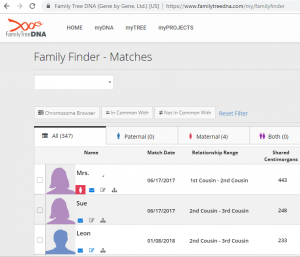
Chances are I won’t see a match called “Most Wanted”
There’s chatter regarding the recent announcement about the “FBI and FamilyTreeDNA.” Some of the chatter is accurate and some of is the result of headlines that are incomplete, misleading, or completely incorrect.
A read of the press release on the FamilyTreeDNA site (https://blog.familytreedna.com/press-release-connecting-families-and-saving-lives/) suggests that the FBI’s access to the data on FamilyTreeDNA parallels that of any user who submits a DNA test–in other words they can see information about the matches of the DNA sample that they submitted. Other access to data beyond that of matches that any user can see is mentioned in the press release:
In the case of FamilyTreeDNA, without a valid court order, law enforcement will only be able to see information that is available to the standard FamilyTreeDNA user.
Some discussion of this FamilyTreeDNA announcement suggests that more data is being shared and that the FBI has access to the DNA of all submitters. As stated earlier, my take on the agreement (based upon the press release) is that the FBI can submit DNA samples and see the matches of that sample–just like I can submit a sample and see matches. This parallels how GedMatch has also been used by law enforcement.
Is it possible that a second or third cousin of yours committed a crime? Certainly. Most of us do not know all the intimate details of all our second and third cousins lives.
This is one criminal research tool and I don’t see any reason to change the fact that I have my DNA submitted to FamilyTreeDNA. Those who have concerns should read:
I’m not telling anyone what to do. We’re just sharing information. Informed users are better users.

2 Responses
The thing is, they slipped a change into the privacy statement last year when they updated for GDPR without telling anyone. You had to be a legal eye to spot it. And then another in December without telling anyone. Prior to these changes users were required to have the permission of the person whose samples they were submitting. Afterward, police don’t need permission to submit samples. They never explicitly said, “Hey, we’re going to start letting police match DNA without getting permission of the person whose samples were collected.”
It was all legal, but unethical.
Philip–thanks for your note. The change in the terms of service without notification is an issue and may change my total perspective on this.